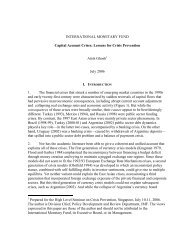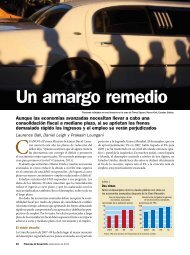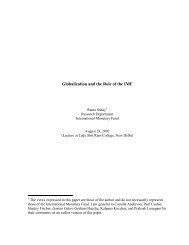Chapter 20: Taxation of Corporate Reorganizations - IMF
Chapter 20: Taxation of Corporate Reorganizations - IMF
Chapter 20: Taxation of Corporate Reorganizations - IMF
Create successful ePaper yourself
Turn your PDF publications into a flip-book with our unique Google optimized e-Paper software.
Tax Law Design and Drafting (volume 2; International Monetary Fund: 1998; Victor Thuronyi, ed.)<br />
<strong>Chapter</strong> <strong>20</strong>, <strong>Taxation</strong> <strong>of</strong> <strong>Corporate</strong> <strong>Reorganizations</strong><br />
is moved within the same country or when the form is changed, most company laws stipulate<br />
that the legal identity <strong>of</strong> the company remains unchanged. 18<br />
G. Recapitalization<br />
Recapitalizations are changes in the way a company is financed, that is, structural<br />
changes in its share capital or outstanding debt. As with most changes in seat or form, the legal<br />
identity <strong>of</strong> the company remains unchanged.<br />
H. Bankruptcy <strong>Reorganizations</strong><br />
Bankruptcy reorganizations may take any <strong>of</strong> the forms described above, with the<br />
distinctive element that one or more companies are declared bankrupt and that as a consequence<br />
the outstanding debt <strong>of</strong> the companies involved is rescheduled. Although the emphasis is on the<br />
reorganization <strong>of</strong> the debt, reorganization <strong>of</strong> share capital may also be involved, as well as the<br />
liquidation <strong>of</strong> one or more corporate entities.<br />
III.<br />
Taxable <strong>Reorganizations</strong><br />
This section considers the tax consequences <strong>of</strong> taxable reorganizations. The discussion is<br />
relevant in several contexts. First, the tax consequences discussed apply in the absence <strong>of</strong><br />
special nonrecognition rules for reorganizations. This is relevant to countries that do not have<br />
such rules and that are considering whether they should be introduced. Second, even in countries<br />
that have nonrecognition rules, some reorganizations will be structured so as to fail to qualify<br />
under those rules and will accordingly be considered taxable reorganizations. Why it may be<br />
advantageous in certain situations for taxpayers to do so is discussed below. Finally, sometimes<br />
taxpayers will seek to structure a transaction so as to qualify for nonrecognition treatment,<br />
without meeting the requirements, so that the transaction is treated as taxable. And other<br />
transactions simply will not possess the required characteristics <strong>of</strong> a tax-free reorganization.<br />
A. Tax Position <strong>of</strong> the Transferor Company<br />
Regardless <strong>of</strong> how a reorganization is effectuated under company law, income tax<br />
systems as a general rule treat reorganizations in which the transferor company disappears as a<br />
transfer <strong>of</strong> assets and liabilities by the transferor to the transferee company. This transfer <strong>of</strong><br />
assets is treated as a sale, from which any gain is taxable and any loss is deductible.<br />
The amount <strong>of</strong> gain or loss is calculated in accordance with the normal income tax rules.<br />
Assuming that all assets are taxed according to the same rules, the gain or loss is calculated as<br />
18 See, e.g., FRA Code civil § 1844-3 (change from one type <strong>of</strong> company to another does not result in creation <strong>of</strong> a<br />
new legal person); P. Verrucoli, Italian Company Law <strong>20</strong>5-<strong>20</strong>7 (association <strong>of</strong> persons can be converted into capital<br />
company and vice versa) (1977). See also Law No. 66-537, supra note 18, §§ 236-238 (providing for change from<br />
société anonyme to other forms); id. § 69 (providing for change from société à responsabilité limitée to other<br />
forms); Schuit, supra note 18, § 9.10[4](change in form does not affect continued existence <strong>of</strong> a corporation).<br />
- 6 -
















